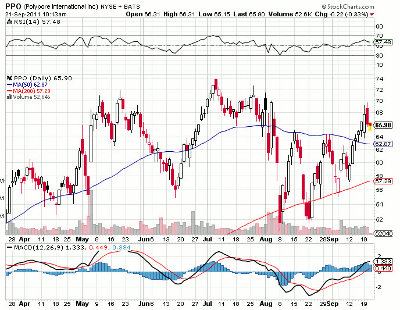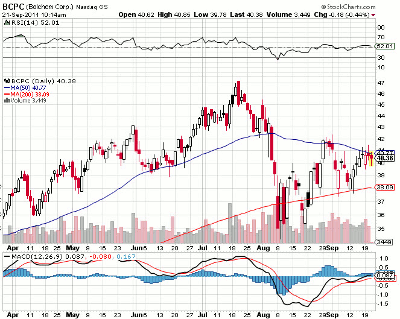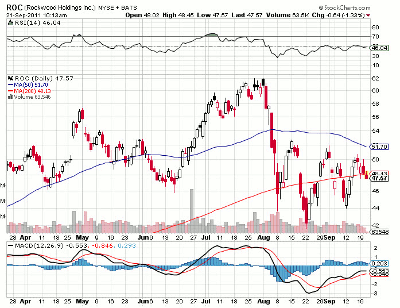Companies that make chemicals and chemical-related gear for industrial customers aren’t the most glamorous names. But don’t overlook unknown companies like Polypore, Balchem, and Rockwood, where earnings growth could inspire future buying from institutional investors, writes MoneyShow.com contributor Kate Stalter.
There’s no question that some industries capture greater investor and media mindshare than others. Not only can it be fun to learn about the latest gear from Apple (AAPL)—or even the latest misstep from Netflix (NFLX)—but many consumer-oriented techs and retailers have products and services that people use in their everyday lives.
In addition, some of those names, like Apple, Netflix, yoga-clothing retailer Lululemon Athletica (LULU), and Ulta Salons (ULTA) have some of the market’s best growth leaders.
But it’s also worthwhile to delve into industries that are more business-to-business focused. These are often not as sexy as techs and retailers, but they can deliver big gains for growth investors.
One such sub-sector is specialty chemicals, used in a variety of industrial applications. Not exactly companies that are in the forefront of consumers’ minds, but institutional investors are aware of the potential.
Polypore (PPO) is crafting the right side of a chart base that began in mid-July. The current price consolidation had trouble gaining traction before an upside move, which got under way in earnest earlier this month. It also undercut the low of the prior consolidation. While that’s not good news for long investors holding the stock, such a move can often flush out weak holders and set the stage for fresh money to come into the stock.
So far in September, Polypore’s stock is showing a gain of more than 8%, and recent weekly volume has been strong to the upside. That’s a good indication that professional buyers are jumping back in.
Polypore’s stock retook its 50-day moving average on September 14, and has held above that key price line since then.
Charlotte-based Polypore has a market cap of about $3.1 billion, and it trades around 848,000 shares per day. The company makes membranes to filter liquids and separate chemicals.
The company has grown its business as a supplier to lithium battery makers. That’s a crucial segment, because lithium batteries are increasingly in demand for consumer electronics gear, such as smartphones. The company is also a supplier to makers of batteries for electric vehicles.
The stock fell Tuesday, after JPMorgan downgraded rare-earth miner Molycorp (MCP), another supplier to the lithium battery industry. JPMorgan forecast lower demand for rare earths in the next two fiscal years.
As of Tuesday, Wall Street consensus estimates call for Polypore to post earnings per share of $2.33 this year and $2.90 in 2012. Those would be increases of 74% and 24%.
Polypore was a price growth leader in 2010 and the first half of this year, as earnings performance bounced back from a decline in 2009. If the company can maintain strong technical levels, and as long as the fundamentals remain solid (despite the JPMorgan note about Molycorp), Polypore could remain a solid growth leader.
NEXT: 2 More Names
|pagebreak|Another chemical-industry name that is attempting to climb out of a consolidation is Balchem (BCPC), which makes ingredients for food makers and the medical industry, as well as animal feed and nutritional products.
The New Hampton, NY company has a market cap of around $1.2 billion, and its average trading volume is just 140,000, making it a thin stock.
It’s a stock that’s had a healthy uptrend since emerging from the bear market in early 2009. Currently, it’s hovering near its ten-week average as it tries to rebound from a price consolidation that began in July.
Downside volume in recent weeks has been heavier than upside volume—not an ideal situation. You’d rather see heavier trade as the stock notches gains, a signal of strong institutional conviction.
The fundamentals of Balchem are good, but the earnings growth rate has slowed for the past two quarters, to 14% most recently. Year-over-year revenue growth has held steady at 22% in the past two quarters. Wall Street has pegged this year’s income growth rate at 16%, to $1.30 per share.
Balchem could be a stock to keep an eye on. But for the moment, its fundamental as well as technical performance both lag that of Polypore.
Rockwood Holdings (ROC) has boasted triple-digit earnings growth in the past six quarters. The sales growth rate accelerated in the past two quarters, from 8% to 23%.
On its chart, the stock continues to consolidate gains after retreating from an all-time high of $62.03, reached in July. The stock has been bouncing around its 40-week moving average, and the ten-week line is heading lower, which could result in a bearish cross of the shorter and longer-term lines.
It’s not unusual to see selling in a stock after a lengthy run-up, so if Rockwood can hold near key moving averages, buyers may step in through the coming weeks and send the stock higher again.
At the time of publication, Kate Stalter did not own positions in any of the stocks mentioned in this column.













